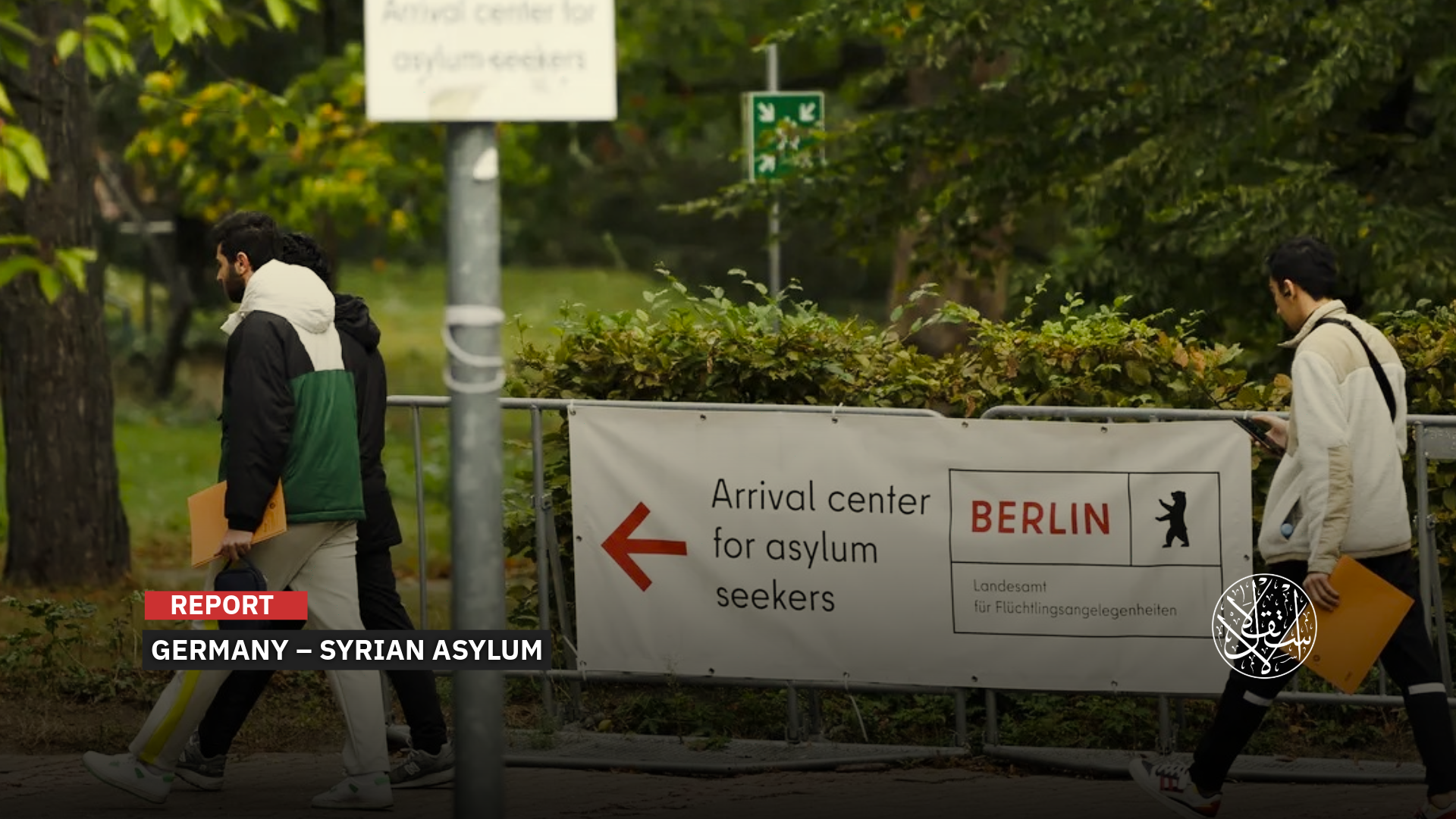How Germany Is Reshaping Its Asylum and Protection Policy for Syrians

“Around 955,000 Syrians are living in Germany as of July 2025.”
German policy, in general, is gradually shifting, especially after the lifting of economic sanctions against Syria, towards a stricter approach to the Syrian refugee issue, amid growing calls for intensified voluntary or even mandatory repatriation.
The German Interior Ministry recently announced the possibility of reaching a deal on deporting Syrian refugees who violate residency regulations back to their country.
These steps come as part of German efforts to streamline the asylum process and reduce the number of those no longer eligible to remain in the country, amid increasing debates about migration and integration policies in Europe.
After the fall of Bashar al-Assad's regime on December 8, 2011, the Federal Office for Migration and Refugees suspended processing Syrian asylum applications, and it remains unclear when it will resume.
Asylum applications are usually processed within six months, but for Syrians, decisions can take up to 21 months.
Nevertheless, Syrians continued to arrive in Germany to apply for asylum, with 17,650 Syrians submitting asylum applications to the Federal Office for Migration and Refugees since the beginning of this year.
Unprecedented Rulings
In what has been described as a shocking development, German policy towards Syrian asylum seekers has recently undergone a significant shift, with rejection rates for asylum applications rising and deportations increasing, reflecting a change in the official approach to the situation in Syria.
In reality, these recent developments have raised widespread concerns within human rights circles, and have prompted questions about the extent to which Germany's policies comply with international and legal standards.
According to reports, obtaining protection or asylum in Germany is no longer automatic for Syrians, as it once was.
With the political situation in Syria changing after the fall of Bashar al-Assad's regime 10 months ago, some German authorities argue that the grounds for protection no longer exist, even though the German authorities themselves still classify Syria as an unsafe country of return.
In this context, the case of a young Syrian man named Odai (25 years old) has come to light.
On September 2, the Federal Office for Migration and Refugees (BAMF) issued a decision rejecting his asylum application and denying him the right to constitutional or subsidiary protection. The decision also stated that there were no grounds to prevent his deportation.
Under this decision, Odai must leave Germany within 30 days of receiving the notification, or after a final court ruling if he files an appeal.
He will also face a 30-month entry and residency ban in Germany and the Schengen area after his deportation.
The German decision was based on the argument that the reasons Odai provided, such as the lack of education and the risk of forced conscription, are considered general circumstances and do not constitute an individual fear of persecution.
In a similar vein, the Administrative Court in Cologne recently issued a ruling rejecting the asylum application of a young man from Hasakah.
The ruling stated that Syrians no longer automatically receive protection, and that the applicant can return to his country without being at risk.
These rulings constitute a dangerous precedent, especially with the recent occurrence of the first actual deportation of a Syrian refugee from Germany to Syria, which was rare in previous years.
It is worth noting that Germany had not carried out any deportations to Syria since 2012, due to the complex political and security situation in the country, which was embroiled in a devastating civil war.
These decisions contradict the principle of non-refoulement, which obliges states not to return any person to a place where they would face torture or a threat to their life.
In this regard, legal experts emphasized that the justification that the Assad regime has fallen does not align with the essence of the Geneva Convention, which is based on an assessment of personal safety, not on the form of the ruling regime.
As of early April, there were still 52,344 asylum applications from Syrians pending a decision by BAMF.

Procedures and Consequences
In a move with significant legal and political implications, German Interior Minister Alexander Dobrindt instructed BAMF to review the protection status granted to a number of Syrians, particularly those classified as security risks.
According to a report published by Die Zeit on September 26, Dobrindt emphasized that the granted protection could be revoked if serious violations were proven.
According to BAMF data, more than 10,000 decisions regarding the review of protection applications for Syrian citizens were issued this year, while protection status was revoked for only 97 individuals.
As of the end of July 2025, the number of Syrians residing in Germany was approximately 955,000.
Between 2015 and 2023, more than 163,000 Syrians were granted German citizenship.
In another development, the German government announced that it had withdrawn a previous proposal put forward by former Interior Minister Nancy Faeser, which would have allowed some Syrian refugees to travel to Syria for short periods without facing legal consequences.
The proposal was strongly opposed by the Christian Democratic Union (CDU/CSU), which considered it a dangerous loophole that would undermine the asylum system and the legal basis for protection.
In a related development, German authorities recently opened files on approximately 734 Syrian refugees after discovering that they had visited their country of origin, which, according to German asylum law (AsylG), is considered an indication that the grounds for protection no longer exist.
The law stipulates that returning to one's home country, even for a short visit or for vacation, is sufficient grounds for reviewing an asylum application.
On the other hand, the Bundestag passed a law on June 27 that freezes family reunification for two years for Syrians granted subsidiary protection and abolishes the expedited naturalization process.
Analyses suggest that these measures will exacerbate the suffering of more than 320,000 Syrian refugees, raising questions about the constitutionality of these laws and their compatibility with the constitutional guarantees protecting the rights of refugees.
For his part, German Chancellor Friedrich Merz called for resuming deportations to Syria, particularly for criminals or those who pose a security threat.
In this regard, Germany recently announced that it will soon begin talks with the new Syrian government to reach a deal on the deportation of rejected Syrian asylum seekers back to their country.
Regarding the potential timing for the start of deportation operations, Interior Minister Alexander Dobrindt said the government is seeking to reach a deal with Syria this year, after which deportations would begin with criminals first, followed by those without the right to remain.

Crucial Moment
Germany’s Federal Office for Migration and Refugees has received 2,424 applications this year from 4,452 Syrians living in the country, noting that 2,132 people have left the country so far.
The Voluntary Return Office offers assistance to Syrians who wish to leave voluntarily, including airfare and medical support of up to €2,000 for up to three months after arrival in their country of origin.
It also provides a one-time payment of €1,000 for each adult and €500 for each child under 18, with a maximum of €4,000 per family.
A recent survey conducted by the infratest dimap institute, a market research institute for Germany, shows that a slight majority of Germans (52%) are in favor of rapid returns of Syrian nationals who are poorly integrated into German society.
Meanwhile, 25% of those surveyed advocated for a greater push in facilitating a general return of Syrians — regardless of their degree of integration.
According to the survey, 13% were against a return at this point, while another 4% said they were generally against a return of Syrians to their home country.
However, the mood among Syrians appears to be quite the opposite: Following Assad's fall.
A survey conducted by the Institute for Employment Research (IAB), which is part of Germany's Federal Employment Agency, found in December 2024 that 66% of Syrians in Germany planned to remain in their adopted new home.
The UNHCR, in a statement, called for increased international support for Syria to resolve the displacement and refugee crisis and to create conditions conducive to voluntary return, stressing that the current phase represents a crucial moment for rebuilding the lives of millions of Syrians.
It noted that more than 1.2 million Syrians have returned to their country since December 2024, while more than 1.7 million internally displaced persons have returned to their areas of origin, highlighting the scale of the humanitarian, economic, and service challenges that remain.
It emphasized the need to provide essential services, including education, healthcare, housing, and livelihoods, to ensure the sustainability of the return process and prevent new waves of displacement.

In turn, lawyer Ammar Ezzeddine explained in a statement to Al-Estiklal that “despite the fall of the Assad regime, the situation on the ground varies from one province to another (presence of local militias, remnants of war, and destroyed infrastructure).”
He pointed out that Germany must proceed with caution before declaring that Syria is safe for the mass return of refugees, emphasizing that any premature assessment could endanger the lives of those returning.
“While European states like Germany are preparing to accelerate deportations, aligning with Syria’s shifting political landscape, millions of displaced Syrians remain caught between fragile hope and the unyielding challenges of daily survival,” he said.
Sources
- Interior minister says Berlin wants deportation deal with Syria
- Over 4,400 Syrians requested voluntary return from Germany since January
- German government adopts controversial EU asylum reform - What does this mean for asylum seekers?
- The federal government wants to enable Syrian refugees to visit their home country [German]
- Administrative Court of Cologne: Not every Syrian citizen is entitled to asylum protection in Germany [German]
- A million Syrians have returned home, but more support needed so millions more can follow
- Should I stay or should I go? Syrians in Germany suffer uncertainty from all directions













